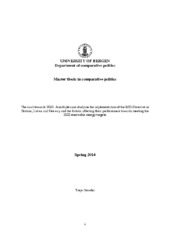| dc.description.abstract | The purpose of this study is to examine which factors have affected the performance of Estonia, Latvia and Norway towards reaching their 2020 renewable energy goals they have committed themselves to as a result of the implementation of Directive 2009/28/EC on the promotion of use of energy from renewable sources. Looking at a number of factors from the literature of EU policy implementation in addition to exploring for new factors, I have conducted interviews with expert respondents in the three countries and in Brussels, in addition to employing a qualitative analysis of documents. The analysis suggests that the main driver affecting performance in the three countries have been their national support schemes, although the implementation has also been affected by the capacity and functioning of the national administrations. Furthermore, domestic politics and influential players have been central in the amendment of the support schemes in Estonia and Latvia. This has resulted in uncertainty among investors in the two countries with potential long-term effects. In Norway, no support scheme changes have occurred, although investor uncertainty has also risen here due to fears that application processing delays may lead to loss of revenues if producers fail to participate in the country's green certificate system. The study thereby introduces investor uncertainty and suspicions of corruption and non-transparency as new variables in the policy implementation literature. While the theory framework of Falkner et al, the Worlds of Policy Implementation", does have explanatory power in the case of Latvia and to a somewhat lesser degree in Norway, it fails to explain the performance of the Estonian case. The study recommends certain modifications to the theory framework by adding new variables and encouraging further research where the typologies are tested against both new policy areas and cases. | en_US |
